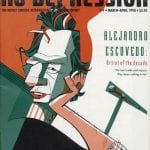Lullaby For The Working Class – We got yer glockenspiel right here
“I just tell people what instruments we use,” Mike Mogis says when asked how he responds to those who want to know what kind of music Lullaby For The Working Class plays. “We have banjo, trumpet, chimes, steel guitar, acoustic guitar, cello, violin and glockenspiel — and it’s all played pretty mellow.”
He neglected to mention ukulele, melodica, dulcimer, kalimba, French horn and clarinet, all of which also put in an appearance on the group’s sophomore record on Bar/None, I Never Even Asked For Light.
Okay, Mogis adds facetiously, let’s just call it “pseudo-classical-neo-avant-country.”
Mogis and Ted Stevens are the heart of Lullaby For The Working Class, whose new album further refines the sound of the band’s debut, Blanket Warm. Both are sneaky records: Lacking the immediate kick of some albums, they instead worm their way into listeners’ hearts gradually on repeat plays. Mogis’ advice about the second record: “Listen to it alone, either in your car or with headphones.”
Indeed, it is through such obsessive, solitary listening that Lullaby’s songs, written and sung by Stevens, really connect. The often unsettled mood set by the lyrics (“This is as close as we get to halfway home,” or, “I doubt there’s a body of water big enough to quench our thirst”) is offset by comforting arrangements that still manage to build and release tension in perfect balance.
Granted, occasionally Stevens tips his hand as a former English and philosophy student with overly fussy words, but more often he manages to neatly capture moments with real precision. In “The Sunset & The Electric Bill”, for example, he sings of approaching a city from the far-off countryside: “It begins as gravel dust and ends as skyscraper,” a phrase anyone who’s made such a journey can relate to.
Given Lullaby’s singular, fully formed sound, it’s hard to believe the band emerged as a mere side project for Mogis and Stevens from the electric rock bands they once played in (one in Lincoln, the other in Omaha). The genesis of much of the material on their debut came from music recorded in a basement and passed around on tapes to friends. Stevens points to Uncle Tupelo’s March 16-20, 1992 album as a particular influence; “It made me see acoustic music as an option,” he says.
The band recently returned from a six-week tour of Europe, their first trip there. And even as new listeners overseas are discovering their first two records, Mogis and Stevens already are looking ahead to a third album, which they expect to be a real departure from its predecessors — more tension and dissonance, they say, and perhaps with more classical instruments.
Mogis hastened to add, though, that a strong melodic sense will remain part of any music Lullaby For The Working Class makes. “But part of making music,” he said, “is never being content, never being satisfied with anything you’ve done.”




